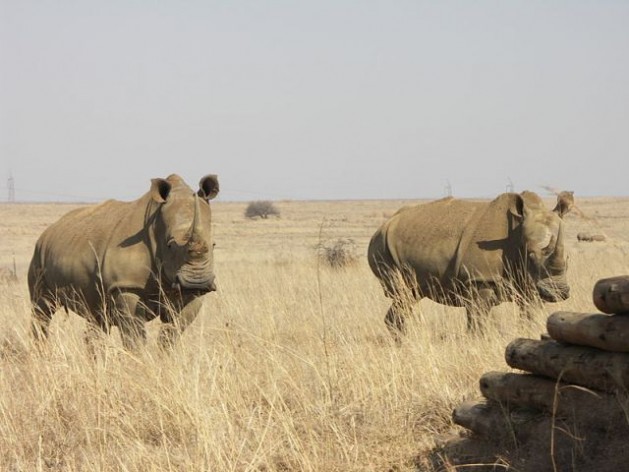Texans Propose to Adopt Threatened African Rhinos
ANIMAL RIGHTS - VEGETARIANISM, 25 May 2015
Lisa Vives, IPS – TRANSCEND Media Service
May 13 2015 –Thefts, murders and mutilation of Africa’s wildlife, from white rhinos to elephants with their prized horns and tusks, are at an all-time high, say conservationists who are keeping track of the poaching of species by fortune-seeking hunters.
To save the animals from further decimation, the U.S.-based Exotic Wildlife Association (EWA) proposes moving about 1,000 of South Africa’s white rhinos to a comparable climate in the U.S.
Allan Warren of the EWA says the need is urgent as rhinos are being poached to near extinction in southern Africa, and there appears to be no effort to stop it.
“The rhino horn is worth about 90,000 U.S. dollars per kilogramme, and each horn weighs about four kilos so it is more valuable than gold,” Warren said.
Under EWA’s scheme, rhinos would relocate to individual ranches in Texas, with South African ranchers granted partial ownership of the rhinos’ offspring. “It is not about hunting, it’s about preserving, saving the species from certain annihilation in South Africa,” Warren said. “Most of the rhinos to be moved are these baby rhinos whose mothers are slaughtered by poachers who slice off their horns.”
According to an “Elephant Summit” in 2013 held in Gaborone, Botswana, run by the International Union for the Conservation of Nature, the majority of animal tusks wind up in Asia. The U.S., Great Britain, Belgium and the Netherlands are also cited to a lesser degree on the summit’s map.
In March of this year, world leaders met again in Kasane, Botswana to review progress since the 2014 London Conference on Illegal Wildlife Trade. According to this group, illegal sales of ivory are now a 19 billion dollar business, 1000 park rangers have been killed by poachers in the last decade, and a rhino is killed every 11 hours.
With Botswana having a tough policing policy that has sharply reduced poaching, South Africa earlier this year approved the transfer of about 100 rhinos to that country. In addition to providing more space, Botswana also has a harsh “shoot to kill” policy against the hunters. It’s controversial, but some wildlife conservationists believe it’s the only way to stem poaching.
A different solution was proposed by Rhinos Without Borders which, in partnership with Great Plains Conservation, as well as various government ministries and safari groups, hopes to move up to 100 rhinos (both black and white) from existing high density populations in South Africa, and release them into the wild in various parts of Botswana.
Meanwhile, the plan to move rhinos to Texas faces several challenges: it needs approval from the US Department of Agriculture, it must find enough ranchers in Texas who want to take the rhinos; and it must raise the funds to move the creatures, at an estimated cost of at least 50,000 dollars per rhinoceros.
________________________________
Edited by Kitty Stapp.
DISCLAIMER: The statements, views and opinions expressed in pieces republished here are solely those of the authors and do not necessarily represent those of TMS. In accordance with title 17 U.S.C. section 107, this material is distributed without profit to those who have expressed a prior interest in receiving the included information for research and educational purposes. TMS has no affiliation whatsoever with the originator of this article nor is TMS endorsed or sponsored by the originator. “GO TO ORIGINAL” links are provided as a convenience to our readers and allow for verification of authenticity. However, as originating pages are often updated by their originating host sites, the versions posted may not match the versions our readers view when clicking the “GO TO ORIGINAL” links. This site contains copyrighted material the use of which has not always been specifically authorized by the copyright owner. We are making such material available in our efforts to advance understanding of environmental, political, human rights, economic, democracy, scientific, and social justice issues, etc. We believe this constitutes a ‘fair use’ of any such copyrighted material as provided for in section 107 of the US Copyright Law. In accordance with Title 17 U.S.C. Section 107, the material on this site is distributed without profit to those who have expressed a prior interest in receiving the included information for research and educational purposes. For more information go to: http://www.law.cornell.edu/uscode/17/107.shtml. If you wish to use copyrighted material from this site for purposes of your own that go beyond ‘fair use’, you must obtain permission from the copyright owner.
Read more
Click here to go to the current weekly digest or pick another article:
ANIMAL RIGHTS - VEGETARIANISM:
